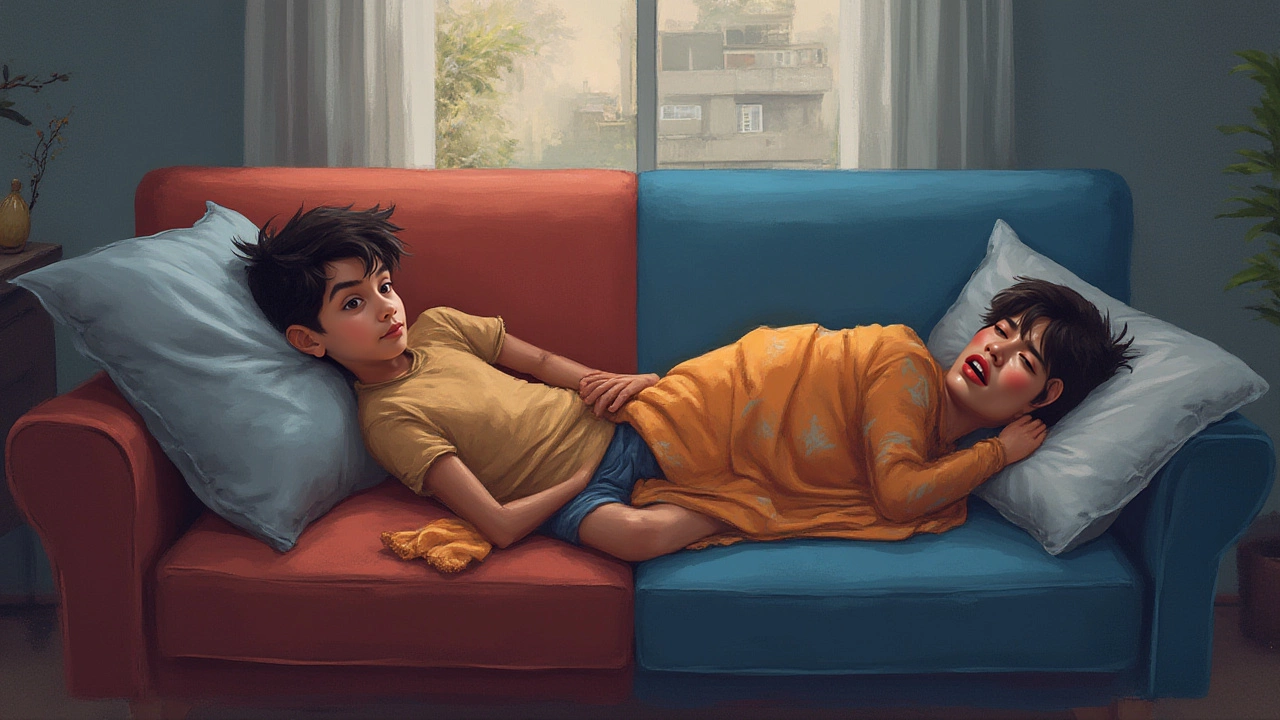Ever woken up on your couch, arm asleep, neck kinked, blanket twisted around your leg, and thought, "Maybe I should just sleep here every night?" Before you roll behind those couch cushions again tonight, you’re probably wondering—does it really matter? Is it actually OK, or are you a sleep disaster waiting to happen?
How Couch Sleeping Messes With Your Body—And Sometimes Doesn’t
The truth is, more people use their sofa as a bed than you’d think. A 2023 poll found that about 17% of Aussies will crash on their couch at least one night a week—sometimes more. Maybe it’s because of roommates, night shifts, or not having a proper bed. Other times, it’s just Netflix, snacks, and a lazy stretch-away from drifting off. But what does it do to you?
First, let’s talk about back and neck pain. Sofas aren’t made for sleep. They’re designed for sitting—reclined, yes, but not fully-horizontal-mattress-styled comfort. Most couches dip in the centre and rise at the edges, and that gap between cushions is a guaranteed trap for your spine. Sleep on a couch long enough, and you’re more likely to wake with stiffness, soreness, or even chronic pain—especially if you already struggle with back or neck issues. The Australian Chiropractors Association points out that poor sleep support can make old injuries feel worse and might even spark new pains over time. The difference really comes down to the support—beds are engineered for it, couches aren’t.
Next up: sleep quality. A 2019 study at the University of Sydney tracked how people slept on couches versus beds over a month. Most participants reported tossing and turning more on the sofa, waking up frequently, and feeling more fatigued during the day. Poor sleep quality doesn’t just make you tired. It plays havoc with your mood, focus, memory, and immunity. Ever feel like you’re getting sick more when you’re couch-bound? There’s your answer.
That said, not everyone feels the heat. Some people, like side sleepers, actually manage to make their couch work—those armrests become makeshift pillows, and the firmness can feel comforting. If you’re short, you might fit just fine. But if you’re tall, you’ve definitely discovered the joys of feet hanging off the armrest or cramming yourself into a fetal position. Flexibility comes with a catch: if you sleep well and hurt less, it might do for a while. But listen to your body—aches and pains that stick around aren’t worth ignoring.
Hygiene can become an issue, too. Couches collect sweat, crumbs, hair, and dust much more than a sheeted bed. This can lead to allergies or skin problems if you’re not cleaning your sofa regularly. The Heart Foundation notes that poor sleep hygiene—literally the cleanliness of your sleep surfaces—can ramp up asthma, eczema, and general itchiness.
Let’s not forget the emotional side. Some people love the comfort of falling asleep in the living room with the glow of the TV. But others—especially if couch sleeping is forced by circumstances or overcrowded living—find the lack of privacy and routine stressful. Sleep is a routine, a ritual. When you’re missing out on that, your rest can suffer, and so does your mood.
So, is sleeping on the couch a total no-go? Not always, but if it’s every night, your body could be feeling the consequences even if you don’t notice right away.

Couch Versus Bed: What the Science and Experts Say
Let’s put couches and beds head-to-head. There’s a reason mattresses cost more than a cheap sofa. Support is the big one: a quality mattress supports your body’s natural alignment, while a typical couch compresses like a marshmallow over time. Sagging cushions don’t distribute weight evenly, and the seams and cracks create pressure spots that numb limbs or tighten muscles overnight. Look at the stats—according to sleep.org, about 83% of people report less back or neck pain when sleeping on a mattress compared to a couch.
Temperature matters. Many couches trap more heat than beds, especially if they’re covered in microfiber or faux leather. If you’re a hot sleeper, prepare to sweat more on a sofa. Night sweats can disrupt your sleep cycle, making things even harder for your body’s nighttime repair process.
There’s a hygiene gap, too. Beds usually include mattress protectors and washable sheets. But when’s the last time you deep-cleaned your couch? Research from the University of Melbourne estimates that sofas can have 12 times the bacteria per square inch than the average toilet seat if they’re never washed. Not the place you want to rest your face for eight hours a night.
Now, let’s be real—sometimes sleeping on the couch is better than nothing. If your partner snores at earthquake levels, your roommate throws all-night benders, or you just need your own space for a bit, a good couch sleep can be a lifesaver. Short-term, you’ll live. But as a permanent setup? Your body (and your mood) will usually pay the price.
Check out the simple breakdown table below comparing beds and couches:
| Feature | Bed | Couch |
|---|---|---|
| Support | Consistent, designed for sleeping | Uneven, sags over time |
| Space | Plenty (especially queen/king) | Limited, armrests in the way |
| Cleanliness | Easy to wash sheets/protectors | Rarely cleaned, collects dust/hair |
| Temperature | Breathable | Traps heat |
| Sleep Quality | High—fewer interruptions | Often restless |
Another key factor: pressure points. Mattress technology is all about controlling pressure points—modern mattresses use memory foam, latex, or carefully designed coils to keep your hips and shoulders aligned. Sofas just don’t do this, which is why side sleeping can leave you with a numb arm, and sleeping on your back might have your head sinking lower than your chest.
According to Dr. Jennifer Tang, a Melbourne-based sleep physician, the biggest complaint among her patients who couch-sleep regularly isn’t just back pain but also "fragmented sleep." You’re more likely to wake often, take longer to fall back asleep, and spend less time in the deep sleep stage your brain craves. This translates to groggy mornings and sharp dips in daytime energy.
What about mental health? A consistent, comfortable sleep environment helps you wind down and signals your body it’s time to switch off. If the couch is your every-night default, you might struggle to separate your sleep space from your "awake" space, confusing your internal body clock. Ever notice how hard it is to sleep when your phone is always buzzing at arm’s length? Same idea: your brain needs boundaries for better rest.
If you notice regular headaches, muscle cramps, increased irritability, or a stronger desire for afternoon naps, you might be dealing with side effects of sleeping on that couch every night. Listen to your body—it rarely lies.

Tips to Survive—and Even Thrive—If Couch Sleep Is Your Only Option
Sometimes, life means you have to make the best of a bad (or just tight) situation. Maybe you’re couch surfing at a mate’s flat, saving money for a new place, or bunking with family for a while. So if you’re stuck sleeping on a couch, how do you actually make it work without wrecking your back or sanity?
Here’s how to hack your "bedroom sofa" like a pro:
- Boost the support: Rim the gap between the cushions with a folded towel or a plush blanket, especially where your lower back hits. If you can, lay down a foam mattress topper, padded yoga mat, or even a spare thick duvet. It evens out the bumps and dips.
- Pillow game matters: Grab two pillows. Use one for your head (or that armrest, if you like), and hug the other between your knees to keep your hips happy if you’re a side sleeper. If your neck is hurting, try a rolled-up towel under it for quick support.
- Keep it clean: Wash a throw blanket every week and vacuum the cushions regularly to get rid of crumbs, hair, and dust mites. If you have a pet, add a lint roller into your bedtime routine.
- Stick to a sleep schedule: Your body thrives on routine. Try to hit the couch around the same time each night and resist the urge to scroll your phone for another hour—the blue light will kill your sleep quality.
- Control light and noise: Eye mask and earplugs can help block distractions from the living room. Even a hoodie pulled over your ears can help (not scientific, just pure lived experience).
- Stay cool: Couches run hot. Try opening a window, using a portable fan, or ditching the heavy blankets if you wake up sweaty.
- Stretch before bed: Loosen those muscles with a few simple stretches. Touch your toes, twist from side to side—keeps your back and hips limber before lying in a weird angle all night.
- Monitor your body: If pain or numbness gets worse, don’t just tough it out. Try overnighting on the floor with a yoga mat and blanket to reset your posture, or swap positions on the couch. Pain is a warning, not a badge of honor.
- Ventilate and flip: Every few days, rotate or flip the couch cushions so you’re not crashing in the exact worn-out groove each night. Give your body a break from uneven spots.
- Boundaries with housemates: If you’re couch-surfing long-term, talk with your crew. Set a "bedtime" when the living room becomes a sleep space so you can get actual shut-eye instead of having people tramp through at midnight.
The big takeaway: sleeping on a couch isn't ideal, but you can make it survivable—or even kind of comfortable—with some clever hacks. But if you notice lasting aches, brain fog, or mood dips, try to move back to a mattress before your body really starts complaining.

